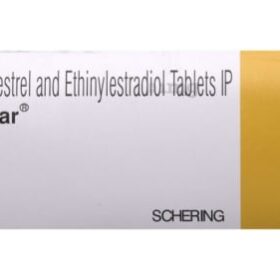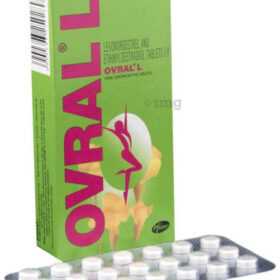
Product
INTRODUCTION
Primolut-N Tablet may be taken with or without food, but it is better to take it at the same time each day. The dose and how often you take it depends on what you are taking it for. Your doctor will decide how much you need so as to improve your symptoms. Swallow the tablets whole with a drink of water. You should take this medicine for as long as it is prescribed to you.
The most common side effects of this medicine include headache, nausea, abdominal pain, vaginal spotting, dizziness, and breast tenderness. Let your doctor know if these bother you or appear serious, as there may be ways of reducing or preventing them. Some side effects may mean you should stop taking this medicine, including if you develop jaundice, migraine, or changes to your speech or senses (eyesight, hearing, smell, taste, and touch). You should also stop taking it if you become pregnant or if your blood pressure becomes too high.
Before taking this medicine, tell your doctor if you are pregnant or breastfeeding, have diabetes, have a migraine, or any liver disease or ever had any problems with your blood circulation. Your doctor should also know about all other medicines you are taking as many of these may make this medicine less effective or change the way it works. This medicine can affect the results of some blood and urine tests so make sure any doctor treating you knows that you are taking it.
USES OF PRIMOLUT-N TABLET
- Heavy menstrual bleeding
- Pain during menstruation
- Endometriosis
- Premenstrual syndrome (PMS)
BENEFITS OF PRIMOLUT-N TABLET
In Heavy menstrual bleeding
In Pain during menstruation
In Endometriosis
In Premenstrual syndrome (PMS)
SIDE EFFECTS OF PRIMOLUT-N TABLET
Common side effects of Primolut-N
- Headache
- Dizziness
- Breast tenderness
- Nausea
- Vaginal spotting
- Vomiting
- Abdominal cramp
HOW TO USE PRIMOLUT-N TABLET
HOW PRIMOLUT-N TABLET WORKS
SAFETY ADVICE
Alcohol
Pregnancy
Breastfeeding
Driving
Kidney
Liver
Use of Primolut-N Tablet is not recommended in patients with severe liver disease. Inform your doctor if you develop signs of jaundice like yellowing of eyes and skin, itching, and clay colored stools.











Reviews
There are no reviews yet.